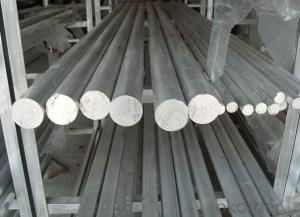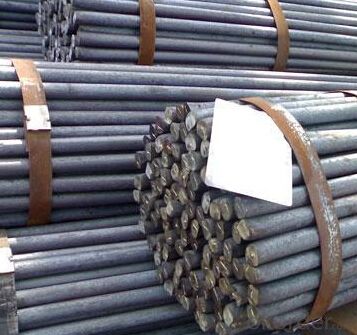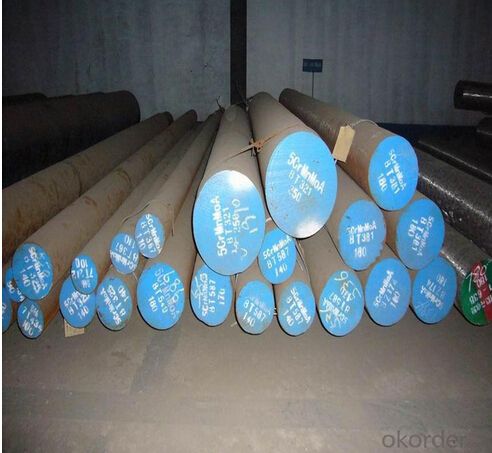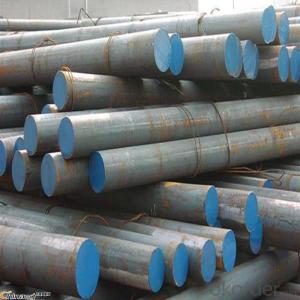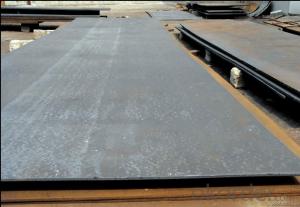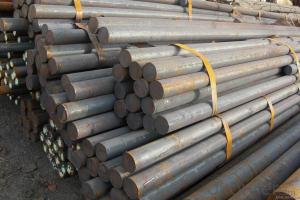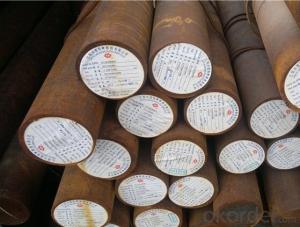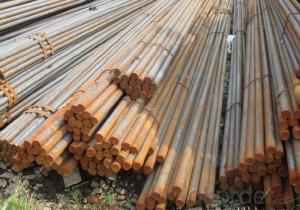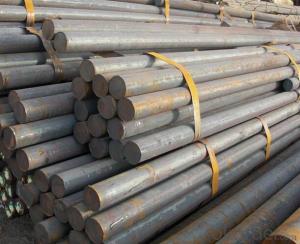3Cr2MnNiMo Tool Steel Special Steel Alloy Steel
- Loading Port:
- China main port
- Payment Terms:
- TT OR LC
- Min Order Qty:
- 25 m.t.
- Supply Capability:
- 10000 m.t./month
OKorder Service Pledge
OKorder Financial Service
You Might Also Like
Specification
Chemical Composition(GB)%
| C | Si | Mn | Cr | Ni | Mo | P | S |
| 0.32-0.40 | 0.20-0.40 | 1.10-1.50 | 1.70-2.00 | 0.85-1.10 | 0.25-0.40 | ≤0.030 | ≤0.030 |
Standard
| GB | ASSAB | DIN | ISO |
| 3Cr2MnNiMo | 718 | 1.2738 | 40CrMnNiMo8-6-4 |
Available Size
| Rolled plate | 12-90mm×610mm×L |
Heat Treatment
| Processing | Temperature ℃ | Hardness |
| Anneal | 690-710 | ≤220HB |
| Quenching | 830-870 | 48-52HRC |
| Tempering | 580-650 | 28-35HRC |
Characterstics
| Characteristics | |||||
| 1.High hardening ability | |||||
| 2.Excellent polishing performance and smoothness |
Applications: Suitable for large size mirror dies,automobile tail lights,domestic electrical applicances,etc


1, Your advantages?
professional products inquiry, products knowledge train (for agents), smooth goods delivery, excellent customer solution proposale
2, Test & Certificate?
SGS test is available, customer inspection before shipping is welcome, third party inspection is no problem
3, Payment Terms?
30% TT as deposit and 70% before delivery.
Irrevocable L/C at sight.
4, Trading Terms?
EXW, FOB, CIF, FFR, CNF
6, After-sale Service?
We provides the services and support you need for every step of our cooperation. We're the business partner you can trust.
For any problem, please kindly contact us at any your convenient time.
We'll reply you in our first priority within 24 hours.
- Q: How is heat-resistant steel used in high-temperature applications?
- Heat-resistant steel is used in high-temperature applications due to its ability to withstand elevated temperatures without losing its structural integrity. This type of steel is commonly used in industries such as aerospace, power generation, and petrochemicals, where it is essential to maintain the strength and performance of components exposed to extreme heat. Heat-resistant steel is used in the construction of furnaces, boilers, heat exchangers, and other equipment that operate under high temperatures, ensuring their reliability and longevity even in challenging environments.
- Q: What are the main applications of special steel in the power storage industry?
- Special steel has various applications in the power storage industry, primarily in the production of battery components and infrastructure. It is widely utilized in the manufacturing of battery cases, frames, and terminals due to its high strength, corrosion resistance, and electrical conductivity properties. Additionally, special steel is used in the construction of power storage facilities and equipment, such as racks and supports, ensuring durability and reliability of the infrastructure. Overall, the main applications of special steel in the power storage industry revolve around enhancing the performance, longevity, and safety of batteries and power storage systems.
- Q: What are the factors that affect the wear resistance of special steel?
- There are several factors that affect the wear resistance of special steel. Some of the key factors include the composition of the steel, particularly the presence of alloying elements such as chromium, tungsten, and vanadium, as these elements can enhance the hardness and toughness of the steel. The microstructure of the steel also plays a significant role, with a fine-grained structure and a homogeneous distribution of carbides generally resulting in improved wear resistance. Additionally, the heat treatment process used to harden the steel can greatly influence its wear resistance, as it affects the formation and distribution of various microstructural features. Surface finish and lubrication conditions can also impact the wear resistance of special steel, as a smooth surface and proper lubrication can reduce friction and wear. Finally, the operating conditions, such as load, speed, and temperature, can significantly affect the wear resistance of special steel, as excessive loads or high temperatures can lead to increased wear and deterioration of the steel's performance.
- Q: What are the different types of corrosion-resistant steel?
- There are several types of corrosion-resistant steel, including stainless steel, galvanized steel, weathering steel, and nickel alloys. Each of these types has specific properties that make them resistant to corrosion in various environments and applications.
- Q: What are the different surface hardening techniques for special steel parts?
- There are several different surface hardening techniques that can be used for special steel parts, each offering unique advantages and characteristics. Some of the most common surface hardening techniques include: 1. Carburizing: Carburizing involves introducing carbon into the surface of the steel part by heating it in a carbon-rich atmosphere. This process creates a hardened outer layer with a high carbon content, while maintaining a tough and ductile core. Carburizing improves wear resistance and increases the overall strength of the part. 2. Nitriding: Nitriding is a process where nitrogen is diffused into the surface of the steel part, forming nitrides. This results in a hard, wear-resistant surface layer with improved fatigue strength. Nitriding can be performed at lower temperatures, reducing the risk of distortion or dimensional changes in the part. 3. Induction Hardening: Induction hardening uses high-frequency induction heating to selectively heat the surface of the steel part. This localized heating is followed by rapid quenching, creating a hardened outer layer. Induction hardening offers precise control over the hardened depth and can be applied to specific areas, enhancing the wear resistance and strength of critical regions. 4. Flame Hardening: Flame hardening involves heating the surface of the steel part using an oxy-acetylene or oxy-propane flame. The heated area is then quickly quenched, resulting in a hardened surface layer. Flame hardening is commonly used for large or irregularly shaped parts and provides excellent wear resistance. 5. Laser Hardening: Laser hardening utilizes a high-intensity laser beam to heat and rapidly cool the surface of the steel part. This process allows for precise control over the hardened area and depth, minimizing distortion and maintaining tight tolerances. Laser hardening is particularly effective for small, complex parts or localized hardening requirements. These surface hardening techniques offer various benefits depending on the specific requirements of the steel part. By choosing the appropriate method, manufacturers can enhance the durability, strength, and performance of special steel parts in diverse applications.
- Q: What are the specific requirements for special steel used in the defense sector?
- Due to the critical nature of its applications, the defense sector imposes highly demanding requirements on special steel. These requirements encompass: 1. Exceptional strength and durability: Special steel utilized in the defense sector must possess outstanding strength and durability to withstand extreme conditions and endure wear and tear. It should have the capacity to endure high levels of stress, impact, and pressure. 2. Superior corrosion resistance: Defense equipment frequently operates in harsh environments and is exposed to elements that can cause corrosion. Consequently, special steel employed in the defense sector must display excellent corrosion resistance properties to ensure the equipment's longevity and reliability. 3. Heat resistance: Defense applications often involve exposure to high temperatures, such as in jet engines or armored vehicle components. Special steel used in these sectors must retain its strength and structural integrity even at elevated temperatures. 4. Machinability and weldability: Special steel employed in the defense sector should possess favorable machinability and weldability characteristics to facilitate manufacturing and assembly processes. This allows for ease of fabrication, repair, and maintenance of defense equipment. 5. Hardness and toughness: Defense applications necessitate a combination of hardness and toughness in special steel. It must resist penetration and deformation while simultaneously being able to absorb energy and resist fracture. 6. Non-magnetic properties: In specific defense applications, such as submarines and magnetic resonance imaging (MRI) equipment, non-magnetic properties are essential. Special steel employed in these sectors must possess low magnetic permeability to prevent interference with sensitive electronic systems. 7. Certification and compliance: Special steel used in the defense sector must meet specific certification and compliance standards, such as those established by defense organizations or international quality management systems like ISO 9001. These standards guarantee the quality, traceability, and reliability of the steel. Meeting these specific requirements for special steel utilized in the defense sector is crucial to ensure the safety, effectiveness, and longevity of defense equipment and systems. Rigorous testing and quality control processes are implemented to ensure that the steel meets the required specifications and standards.
- Q: How does special steel resist thermal fatigue?
- Special steel is able to resist thermal fatigue due to its unique composition and properties. Thermal fatigue occurs when a material is subjected to repeated heating and cooling cycles, leading to the formation of cracks and eventual failure of the material. Special steel is specifically designed to withstand extreme temperature changes. It has a high melting point and excellent thermal conductivity, which allows it to efficiently dissipate heat and minimize thermal stress. Additionally, the steel is often alloyed with elements such as chromium, nickel, and molybdenum, which enhance its resistance to thermal fatigue. The alloying elements in special steel form a protective layer that acts as a barrier against oxidation and corrosion. This protective layer prevents the formation of cracks and improves the steel's ability to withstand thermal cycling. Furthermore, the alloying elements improve the steel's structural integrity by promoting the formation of fine and evenly dispersed microstructures. This enhances the steel's toughness and resistance to cracking. Moreover, special steel undergoes various heat treatment processes to further enhance its resistance to thermal fatigue. These processes involve controlled heating and cooling cycles, which refine the microstructure of the steel and make it more resistant to deformation and cracking. The heat treatment also helps in relieving any residual stresses that may have been induced during the manufacturing process. In summary, special steel resists thermal fatigue through its unique composition, alloying elements, and heat treatment processes. Its high melting point, excellent thermal conductivity, and protective layer against oxidation and corrosion make it highly resistant to thermal cycling. The refined microstructure and relieved residual stresses further enhance its ability to withstand repeated heating and cooling cycles without failure.
- Q: How does special steel contribute to product innovation?
- Product innovation is greatly influenced by the use of special steel, which offers various advantages. Firstly, special steel provides superior mechanical properties, including high strength, hardness, and wear resistance. These qualities permit designers and engineers to develop innovative products that can endure higher levels of stress, function in extreme conditions, and have extended lifespans. An excellent illustration of this is the aerospace industry, where special steel is frequently employed to manufacture lightweight yet robust components that enhance fuel efficiency and overall aircraft performance. Furthermore, special steel can be customized to possess specific attributes such as corrosion resistance, heat resistance, or magnetic properties. This enables the creation of groundbreaking products capable of operating in demanding environments like marine structures, power plants, or electronic devices. For instance, in the medical field, special stainless steel alloys are extensively used to produce implants and surgical instruments that are biocompatible, long-lasting, and resilient to rigorous sterilization processes. Additionally, special steel can be fabricated with precise dimensions and tolerances, facilitating intricate and complex designs. This fosters product innovation by allowing the production of intricate components such as gears, bearings, or turbine blades, which necessitate high precision and reliability. These advanced designs have the potential to enhance the efficiency, performance, and overall functionality of various products, ranging from automotive engines to wind turbines. Moreover, the versatility of special steel permits its combination with other materials, such as polymers or composites, to create hybrid products with unique properties. This opens up avenues for innovation in various industries, including automotive, construction, and consumer electronics. For example, special steel-reinforced concrete structures exhibit increased robustness and durability, while special steel-reinforced polymers enhance the strength and impact resistance of lightweight components. In conclusion, special steel contributes significantly to product innovation by offering enhanced mechanical properties, tailored characteristics, precise dimensions, and compatibility with other materials. These capabilities empower designers and engineers to develop innovative products with improved performance, durability, and functionality, thereby driving advancements across diverse industries.
- Q: Can special steel be used in the musical instrument manufacturing industry?
- Yes, special steel can be used in the musical instrument manufacturing industry. Special steel alloys such as stainless steel or nickel silver are often used in the production of certain musical instruments to enhance their durability, resistance to corrosion, and overall performance. These alloys provide specific tonal qualities and are commonly utilized in the manufacturing of components such as strings, valves, and instrument bodies.
- Q: How does special steel perform in terms of thermal expansion?
- Special steel typically has a lower coefficient of thermal expansion compared to other types of steel. This means that it expands and contracts less when subjected to temperature changes, resulting in better dimensional stability and reduced risk of warping or cracking.
Send your message to us
3Cr2MnNiMo Tool Steel Special Steel Alloy Steel
- Loading Port:
- China main port
- Payment Terms:
- TT OR LC
- Min Order Qty:
- 25 m.t.
- Supply Capability:
- 10000 m.t./month
OKorder Service Pledge
OKorder Financial Service
Similar products
Hot products
Hot Searches
Related keywords
